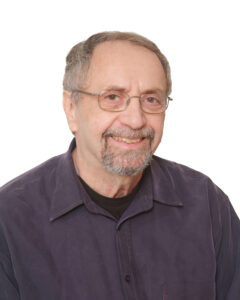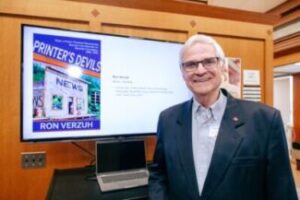Homage to the Mac-Paps
Keefer Street
by David Spaner
Vancouver: Ronsdale Press, 2024
$24.95 / 9781553807209
Reviewed by Ron Verzuh
*

Reading David Spaner’s novel about Canadians who fought in the Spanish Civil War is an exciting way to learn about that bloody prelude to the Second World War. It’s also a way to travel vicariously with the hundreds of young Canadians as they fight to preserve Spanish democracy.
The book is fiction, but the historic references are real as Spaner toggles from 1930s Vancouver to 1980s Spain in telling the story of Canada’s Mackenzie-Papineau Battalion. The Mac-Paps were a ragtag army that was part of the International Brigades devoted to fighting General Francisco Franco’s invading fascist forces.
The story’s main character is Jake Feldman (later Jack Fields to escape antisemitic racism). We first visit his childhood home and meet his older brother Ernie, his sister Rachel (an aspiring dancer), and Frieda, the Jewish mother who has been left on her own when husband Isaac, a haberdasher, moves to northern BC.
We follow Jake, his siblings and friends through their struggling childhoods into adulthood, first jobs, early loves, and life’s many troubles. Jake’s activism reveals a restless soul trying to make sense of what is happening in Spain and pondering his own destiny at home.
But Keefer Street is no ordinary life drama. Instead it is filled with real-life situations that play out on a backdrop of civil war. Leftist debates pepper the story and familiarize readers with the political intensity that marked the 1930s and continued into the 1980s.
Though Jake and his comrades share their thoughts about the war, ultimately words are not enough and there is a call to action. One incident illustrates Jake’s coming commitment. When a Nazi ship docks in Vancouver, he and his friends burn the ship’s flag to let them know which side they are on. “Pulling a lighter from my pocket, I reach for the swastika flag billowing over Vancouver harbour,” Jake says. The act invigorates the crowd and makes Jake an instant hero while serving as a political awakening that urges him on to Spain.
Vancouver-based Spaner (Solidarity: Canada’s Unknown Revolution of 1983) moves us capably through the characters’ lives. He adds details that suggest he himself was close to people, possibly Mac-Paps, who could supply snippets of dialogue based on lived experience. In revealing the horrors of the battlefield, Spaner takes us to the front at numerous towns where the Mac-Paps fought–Belchite, Turuel, Ebro, Jarama, Albacete. Dr. Norman Bethune makes an appearances at some of them with his famed mobile blood transfusion unit.

Spaner reminds us that these were not battles the Canadian government or the Legion recognized as legitimate military operations. In fact, when Jake enlisted it was without his government’s permission. Ottawa had outlawed such participation. When the Spanish government, elected in 1935, was being bombarded by Franco with help from Hitler and Mussolini, our government refused to provide arms to the Republican army defending the country. As Spaner reminds us, we own the shame of those failures and all Canadians paid the price of this neglect when the world erupted soon after Franco imposed his brutal regime in 1939.
Much of the book’s wartime action comes in flashbacks during a 1980s reunion tour of the civil war battlefield. Here Spaner reveals the emotional scars that remain even decades later as the Mac-Paps and their comrades in the American Abraham Lincoln Brigade meet to reminisce at various locations.
These are moving scenes that result in emotional exchanges with Jake sometimes playing mediator. Remembering, as British writer George Orwell showed in his Homage to Catalonia, brings bloody thoughts to the surface and can unearth opposing memories. Spaner does not shy from including such moments and these add a tough realism to the novel.
Choosing to set his story in the war years and stretching it into the long aftermath required some delicate tiptoeing through the fractious history of a conflict that took many twists and turns and had many competing sides–communists, Stalinists, Trotskyists, anarchists. One interesting account, called The Breaking Point: Hemingway, Dos Passos and the Murder of Jose Robles (Counterpoint, 2012) illustrates this by revealing the disintegration of the writers’ friendship.
Setting half of the novel in Vancouver’s Strathcona neighbourhood also has potential potholes. Spaner needed to get it right. Many people on the left have a special place in their hearts for Spain. Many still reside in Vancouver or have younger family members there and they are well schooled in what happened. They also serve as reminders of lost ones and lost friendships. Tempers can still flare on occasion when people gather at the memorial to the Mac-Paps near the B.C. Parliament buildings in Victoria or at two other monuments elsewhere.
Spaner does well to remind us of the various literary, musical, and film depictions of the war. Jake gets a taste of gritty urban life from Theodore Dreiser’s Sister Carrie. Paul Robeson, the great American singer and freedom fighter, inspires Jake, as does John Garfield in The Fallen Sparrow. Garfield, as Spaner notes, shot the villain who was played by the father in the popular TV family show Leave It To Beaver. Garfield was later blacklisted by HUAC (House Committee on Un-American Activities). For Whom the Bell Tolls with Gary Cooper and Ingrid Bergman offers another depiction of the war. Spaner points out that Cooper named names before HUAC. It doesn’t rate a mention in the book, but Hemingway’s short documentary The Spanish Earth also adds a touch of earthy realism.
Writing a novel might be a sure way to skirt the repeated legislative attempts to silence any contemporary political discussion about the war. The Pact of Forgetting in the 1970s, for example, was intended to suppress talk of the difficult questions surrounding the Franco autocracy in aid of the transition to democracy. After several other attempts, in 2022 Spain’s socialist government enacted the Democratic Memory Law to help manage the legacy of Franco.
When I visited Spain a few years ago on a personal tour of Mac-Pap battle zones, the pacts seemed to have clamped down on both left and right to demolish any memory of what Spaner so movingly describes.
The reunion tour ends with a sudden death and Jake is called upon to offer a eulogy. He turns to remind his comrades that “Our international solidarity with Spain was an act of human decency that should live on in some way.” With Keefer Street, Spaner has chosen an effective way.
The book is recommended reading for anyone who was part of the left in the 1960s or wants to learn more about it. Spaner recalls every hot spot on the left memory list, including the Battle of Ballantyne Pier, the On-to-Ottawa Trek, the riot at Christie Pits in Toronto, various relief camp rebellions, and the many political efforts to raise funds for the Republican cause. It should also become a textbook for high school history classes in need of a dose of truth about Canada’s role in a conflict that still puzzles and fascinates the world.
*
Further reading: see Giles Tremlett’s Ghosts of Spain (Bloomsbury, 2008) for an excellent account of the forgetting laws and other views on why Spaniards are the way they are. Also see Ronald Liversedge and editor David Yorke’s Map-Pap: Memoir of a Canadian in the Spanish Civil War (New Star, 2013) and Mark Zuehlke’s The Gallant Cause (John Wiley and Sons, 2007).

*

Ron Verzuh is a writer and historian. [Editor’s note: He has recently reviewed books by Ken McGoogan, Dietrich Kalteis, Grant Lawrence, Howard White, Eileen Delehanty Pearkes, and Vince R. Ditrich for BCR.]
*
The British Columbia Review
Interim Editors, 2023-25: Trevor Marc Hughes (non-fiction), Brett Josef Grubisic (fiction and poetry)
Publisher: Richard Mackie
Formerly The Ormsby Review, The British Columbia Review is an on-line book review and journal service for BC writers and readers. The Advisory Board now consists of Jean Barman, Wade Davis, Robin Fisher, Barry Gough, Hugh Johnston, Kathy Mezei, Patricia Roy, and Graeme Wynn. Provincial Government Patron (since September 2018): Creative BC. Honorary Patron: Yosef Wosk. Scholarly Patron: SFU Graduate Liberal Studies. The British Columbia Review was founded in 2016 by Richard Mackie and Alan Twigg.
“Only connect.” – E.M. Forster
2 comments on “Homage to the Mac-Paps”